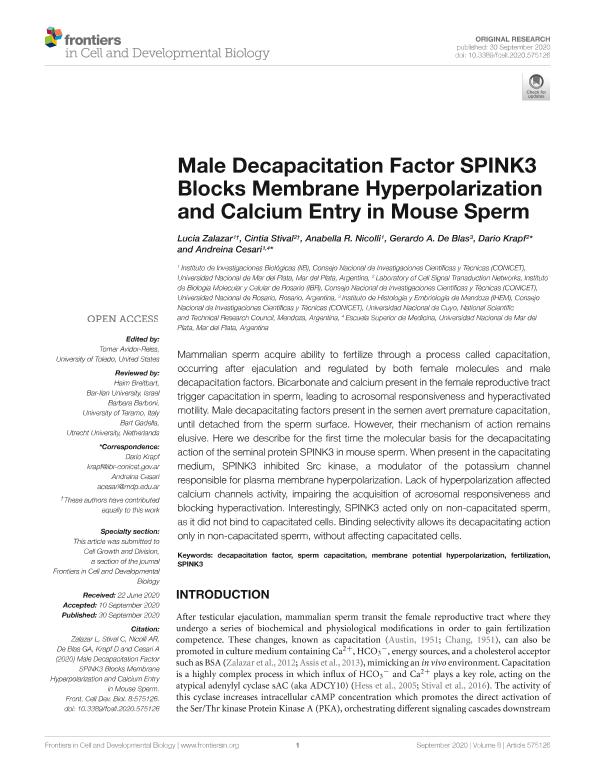Artículo
Male Decapacitation Factor SPINK3 Blocks Membrane Hyperpolarization and Calcium Entry in Mouse Sperm
Zalazar, Lucia ; Stival, Cintia Estefanía
; Stival, Cintia Estefanía ; Nicolli, Anabella Rita
; Nicolli, Anabella Rita ; de Blas, Gerardo Andrés
; de Blas, Gerardo Andrés ; Krapf, Dario
; Krapf, Dario ; Cesari, Andreina
; Cesari, Andreina
 ; Stival, Cintia Estefanía
; Stival, Cintia Estefanía ; Nicolli, Anabella Rita
; Nicolli, Anabella Rita ; de Blas, Gerardo Andrés
; de Blas, Gerardo Andrés ; Krapf, Dario
; Krapf, Dario ; Cesari, Andreina
; Cesari, Andreina
Fecha de publicación:
09/2020
Editorial:
Frontiers Media S.A.
Revista:
Frontiers in Cell and Developmental Biology
ISSN:
2296-634X
Idioma:
Inglés
Tipo de recurso:
Artículo publicado
Clasificación temática:
Resumen
Mammalian sperm acquire ability to fertilize through a process called capacitation, occurring after ejaculation and regulated by both female molecules and male decapacitation factors. Bicarbonate and calcium present in the female reproductive tract trigger capacitation in sperm, leading to acrosomal responsiveness and hyperactivated motility. Male decapacitating factors present in the semen avert premature capacitation, until detached from the sperm surface. However, their mechanism of action remains elusive. Here we describe for the first time the molecular basis for the decapacitating action of the seminal protein SPINK3 in mouse sperm. When present in the capacitating medium, SPINK3 inhibited Src kinase, a modulator of the potassium channel responsible for plasma membrane hyperpolarization. Lack of hyperpolarization affected calcium channels activity, impairing the acquisition of acrosomal responsiveness and blocking hyperactivation. Interestingly, SPINK3 acted only on non-capacitated sperm, as it did not bind to capacitated cells. Binding selectivity allows its decapacitating action only in non-capacitated sperm, without affecting capacitated cells.
Archivos asociados
Licencia
Identificadores
Colecciones
Articulos(IBR)
Articulos de INST.DE BIOLOGIA MOLECULAR Y CELULAR DE ROSARIO
Articulos de INST.DE BIOLOGIA MOLECULAR Y CELULAR DE ROSARIO
Articulos(IHEM)
Articulos de INST. HISTOLOGIA Y EMBRIOLOGIA DE MEND DR.M.BURGOS
Articulos de INST. HISTOLOGIA Y EMBRIOLOGIA DE MEND DR.M.BURGOS
Articulos(IIB)
Articulos de INSTITUTO DE INVESTIGACIONES BIOLOGICAS
Articulos de INSTITUTO DE INVESTIGACIONES BIOLOGICAS
Citación
Zalazar, Lucia; Stival, Cintia Estefanía; Nicolli, Anabella Rita; de Blas, Gerardo Andrés; Krapf, Dario; et al.; Male Decapacitation Factor SPINK3 Blocks Membrane Hyperpolarization and Calcium Entry in Mouse Sperm; Frontiers Media S.A.; Frontiers in Cell and Developmental Biology; 8; 9-2020; 1-13
Compartir
Altmétricas



